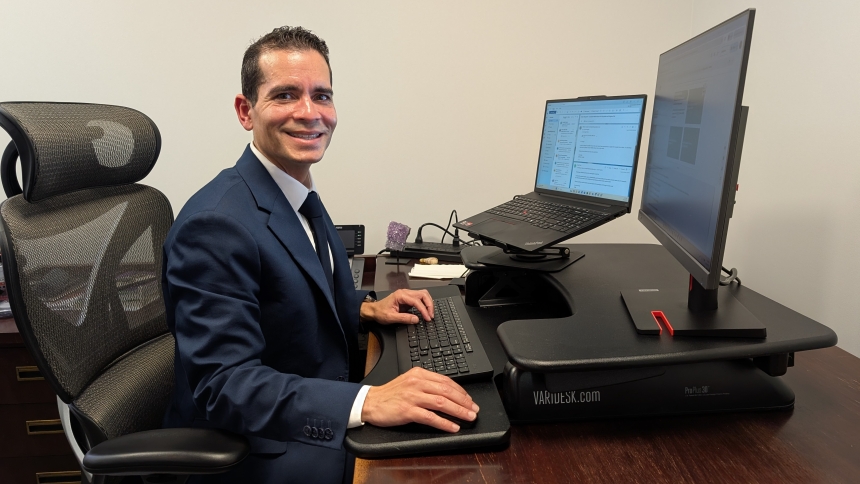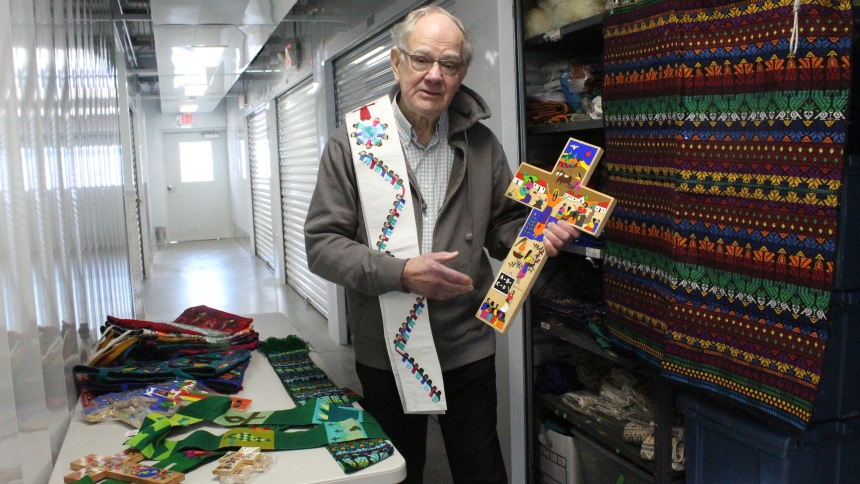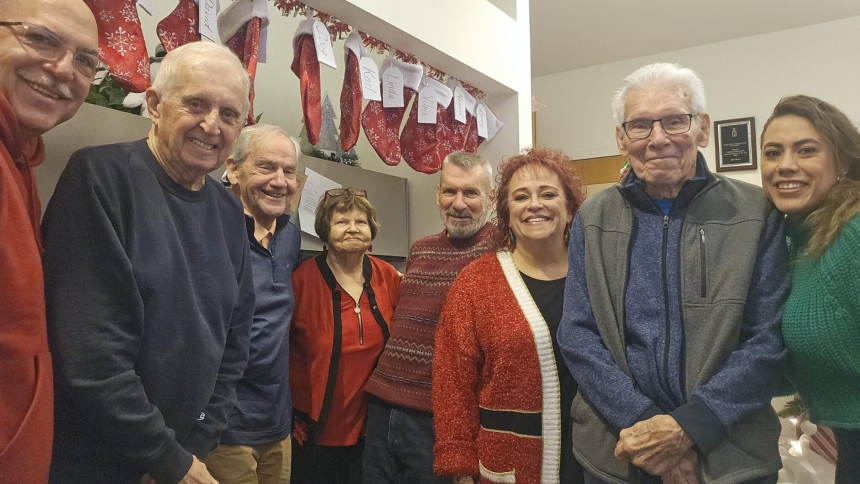
MERRILLVILLE - The Diocese of Gary has hired Dr. Jorge Peña as the new assistant superintendent of school operations for the Diocese of Gary. He will support the Catholic schools in areas such as accreditation, school improvement and operational efficiency.
Before his current role, Peña worked as a senior consultant and improvement specialist at Koru Strategy Group and served as the Andrew Greeley Endowed Research Fellow at Loyola University Chicago. He held the position of clinical assistant professor in Loyola’s educational leadership master’s program, where he prepared Catholic school educators to lead high-performing Catholic schools. He also served as the Director of School Improvement and Catholic School Accreditation for the Archdiocese of Chicago and as the Associate Principal at De La Salle Institute.
As an accreditation leader, he has guided multiple schools through rigorous review processes that meet diocesan, state and national standards. He received the Servant Leadership Award from AdvancED (now known as Cognia). Additionally, Peña is a member of the Data Wise Advisory Board at the Harvard Graduate School of Education and coaches schools in the U.S., Australia and Chile on utilizing the Data Wise Improvement Process.
Peña holds an Ed.D. in Educational Leadership and Administration from DePaul University, an M.S.Ed. in Curriculum and Instruction from Chicago State University, a B.A. in Sociology from the University of Vermont, the Certificate in Advanced Educational Leadership, and the Certified Data Wise Coach credential, both from the Harvard Graduate School of Education.
Peña was born in Puerto Rico, attending Catholic school from kindergarten through second grade. His father was in the military, which prompted the family to move to Kentucky, near the Tennessee border. The family resided there for a year before moving to New Haven, Conn., where he was raised.
Looking back as an educator on his own experience as a learner, he now reflects that the schools he attended didn't celebrate children as students.
“There were low expectations for learning,” he explained. “Special education was in the basement of the building. Both in high school and middle school, they did what is called tracking, a way to put students in tracks of programs. There was an upper accelerated program, a regular program and a remedial lower program.”
Peña said the students quickly figured out “who was who” based on their peer group and to which track they were assigned. Peña believes these tracks often became self-fulfilling prophecies.
Peña noted there was violence, gangs, drive-by shootings and illegal drugs in the community where he grew up. He came to understand that education was the way to change his environment. During his senior year of high school, he had a hard time completing his college applications, so his counselor put him in contact with a graduate student who came to his house with a typewriter and provided feedback on his essays while helping to type up his applications.
Around that time, Peña watched the movie “Stand and Deliver” and remembers being inspired by Jaime Escalante as a teacher.
Peña went on to attend college at the University of Vermont and study sociology. He then learned of a program called Teachers for Chicago for non-education majors, targeting those interested in a career change.
The graduate program brought Peña from the East Coast to Chicago to learn how to be an effective teacher. One of his first teaching jobs was on the east side of the city, on the border of Hammond and Whiting, at a new middle school for seventh and eighth graders. The principal, he shared, worked really hard to construct the small building and annex for middle school students. Peña was part of the new faculty team, and he was ready to teach to high expectations.
Peña said everyone on the team worked hard at building relationships with the students. The student demographic was predominantly Mexican American, and Peña taught reading, math and social studies. In the first year, the students were not required to be tested, but in the second year, the staff administered the city test called the Iowa Test of Basic Skills.
“We were not teaching basic skills,” explained Peña. “We were teaching rigorous skills. We administered the test, and about a month later, the results came back, and our students did stellar, extremely well. They surpassed their grade level.”
The central school office had some doubts about the results, however, and ended up bringing in their own people to retest the students a few weeks later. Peña said they were comparing their performance to the local schools or neighboring schools, and compared to how those schools were doing, the school he was at was doing much better.
“A couple of weeks after that, our principal comes to the middle school faculty meeting, and she says the results are back, and our students did a little better than the first time,” Peña said. “It was a big cause for celebration.”
Peña calls that narrative his “why” story, the reason he became an educator.
“I believe that each student can learn to high standards, to high expectations,” he said. “If I become a better teacher, and if we as a team become a better team, and if we get better as a school, that's going to have a positive impact on the learning of our students.”
After that, Peña was invited to come to De La Salle Institute as an assistant principal and helped launch the first computer program in the city of Chicago. During his 12 years of employment there, he was in charge of the honors program and career accreditation.
Working with local accreditation teams, Peña met Sister Mary Paul, the superintendent of the schools in the Archdiocese of Chicago, who asked him to come on board to help with systems accreditation. He was working in that role for the archdiocese when Loyola University asked him if he'd be interested in teaching graduate students in educational leadership, which developed into a full-time position. Peña also began working with Harvard Graduate School of Education as a Data Wise coach, supporting educators using the improvement process called Data Wise.
Peña worked with Superintendent Colleen Brewer and Assistant Superintendent Jodi McLawhorn at the Archdiocese of Chicago. They were principles when Peña was the director of school improvement. He also worked with them through Harvard and the Data Wise program.
“When I saw that there was an opportunity here at the Diocese of Gary working with Colleen and Jodi, I thought about our time in Chicago and the work we did with Data Wise,” he said. “I was very excited and hopeful that if the stars aligned, and if it was God's will, I would get the job. I also was longing to return to Catholic education as well.”
Peña plans to use some of the Data Wise practices to help diocesan schools. He shared that the schools have already been encouraged to focus on three goals (academic excellence, Catholic identity and operational identity) and are working on curriculum mapping.
In time, Peña hopes administrators and faculty within the schools will come to view him as an ally and a coach.
“The players are on the field, and the coach is on the sideline,” he said, using the analogy. “The coach is observing, taking evidence of what's happening and then sharing with the athletes, ‘This is what I notice.’ Our principals and teachers are on the field, and my role as an assistant superintendent is to be their coach and to provide support. I need to ensure that they feel competent and that we are working together as one team.”
Peña added he is feeling very thankful and blessed to be working in the Diocese of Gary, stating everyone he's met, from pastors to school personnel, has been very welcoming.
In the past few weeks, Peña had the opportunity to witness the Catholic schools celebrating the return of students to the classroom, many of them knowing the students' first names, smiling and showing enthusiasm.
“That is so important for students to know that the school is a place that cares about me. Now when I run into difficulty, I'm not going to feel hesitant to seek help because these are people that care, that value, that see me,” he said. “I wish those were the experiences that I had as a learner.”
Outside of the Office:
• Peña participates in shipwreck scuba diving. He is a member of the Underwater Archaeological Society of Chicago, which meets monthly to study Lake Michigan shipwrecks and research topical underwater subjects of historical interest.
• Peña is a beekeeper. As a member of a community garden on the southside of Chicago, he was asked by the garden lead to think of a new addition for the garden, leading Peña to suggest adding bees to increase pollination.
• Peña adopted a puppy he named Coco during the coronavirus pandemic. They have attended many dog training classes, completing beginner, intermediate, advanced and therapy dog programs.



